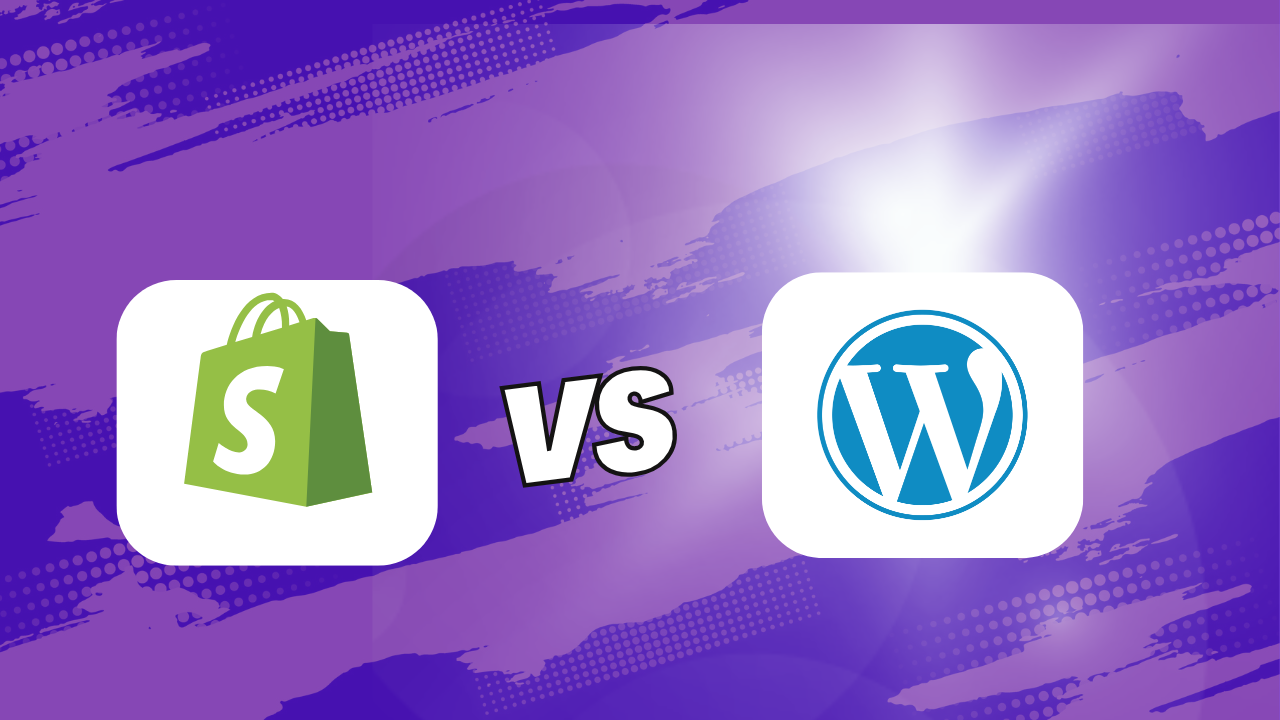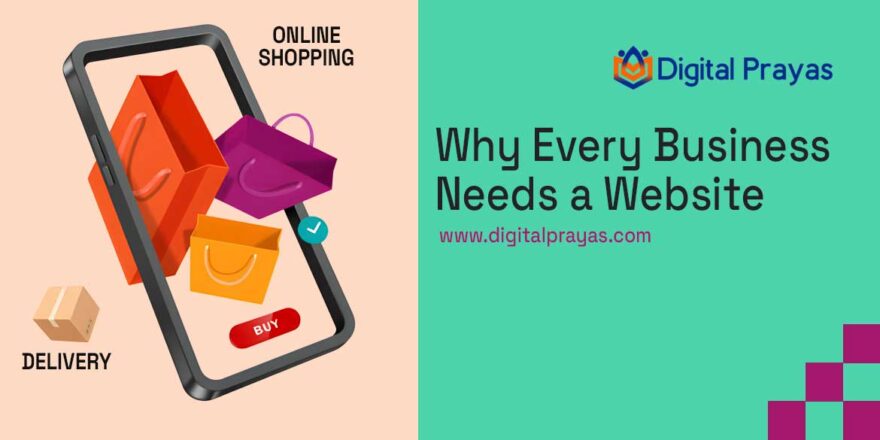If you’ve ever thought about starting your own online store, you’ve probably come across Shopify and WordPress. These two are among the most popular platforms for building an e-commerce site. But when it comes to Shopify vs WordPress, which one is right for your business?
The answer isn’t the same for everyone—it depends on your goals, technical skills, budget, and what kind of online experience you want to offer your customers.
In this guide, we’ll walk you through a clear, side-by-side comparison of WordPress vs Shopify, covering everything from setup and customization to cost, SEO, and more. Let’s make your decision a little easier.
1. Ease of Use & Setup (Shopify vs WordPress)
Shopify:
Shopify is a fully hosted platform, which means everything is already set up for you. You don’t have to worry about hosting, installing software, or dealing with updates and backups. You just sign up, pick a theme, customize a few settings, and you’re ready to start selling. This makes Shopify a great choice for beginners or anyone who wants to get an online store up and running quickly, without too much tech stuff.
WordPress (with WooCommerce):
With WordPress, things are a bit more hands-on. You’ll need to find a hosting provider, install WordPress, and then add WooCommerce (the plugin that turns your site into an online store). It takes more steps, but in return, you get complete control over your website. If you’re comfortable doing a little setup or have a developer helping you, it’s a solid option.
2. Customization & Design Flexibility (Shopify vs WordPress)
Shopify:
Shopify has a great selection of clean and professional themes—some free, others paid. You can customize your store using its drag-and-drop editor, which is simple and user-friendly. But if you want deep customization, you might need to work with a developer or learn Shopify’s Liquid code.
WordPress:
WordPress is known for its flexibility. There are thousands of themes and plugins to choose from, both free and premium. With the Gutenberg editor and page builder plugins like Elementor or Divi, you can create highly customized designs. It’s ideal for anyone who wants full creative freedom and doesn’t mind getting their hands a bit dirty (or working with someone who can help).
3. Cost & Pricing (Shopify vs WordPress)
Shopify:
Shopify offers tiered pricing, starting at around $39/month for the Basic plan. This includes hosting, SSL, and access to support. However, transaction fees and extra costs for premium apps and themes can add up. So while it’s convenient, it might be pricier over time.
WordPress:
WordPress itself is free, but there are other costs to consider: hosting, domain name, a premium theme (optional), and maybe a few paid plugins. Overall, WordPress with WooCommerce can be more budget-friendly, especially if you’re okay with managing a few things yourself.
4. E-Commerce Features (Shopify vs WordPress)

Shopify:
Shopify is built for selling, so everything is geared toward e-commerce—inventory management, payment gateways, order tracking, abandoned cart recovery, and more. It also has its own built-in POS (Point of Sale) system for selling in person. The features are:
- Inventory management
- Secure checkout
- Abandoned cart recovery
- Integrated payment gateways
- Shopify POS for in-store sales
- Fraud analysis
- Multi-channel selling (Instagram, Amazon, Google)
WordPress (WooCommerce):
WooCommerce is powerful and very flexible. It supports physical and digital products, various payment gateways, and can handle just about anything Shopify does—but often through additional plugins. It’s best for those who want to tailor their store to specific needs. The features includes:
- Advanced shipping options
- Inventory management
- Secure checkout
- Integrated payment gateways
- Abandoned cart recovery (with third-party plugin)
- Subscriptions
- Invoicing
- Point of Sale
5. SEO Capabilities (WordPress vs Shopify)
Shopify:
Shopify offers solid built-in SEO features like editable meta tags, alt text, and mobile-friendly designs. It also loads fast, which helps with rankings. But SEO options are a bit limited compared to WordPress, especially when it comes to full content control.
WordPress:
WordPress is widely loved for SEO. With plugins like Yoast or Rank Math, you can dive deep into optimizing your content. You can also tweak technical SEO aspects like permalinks, schema markup, and more. If ranking on Google is a top priority, WordPress gives you more control. Check out our WordPress SEO services.
6. Security (WordPress vs Shopify)
Shopify:
Security is one of Shopify’s strengths. It’s PCI-DSS compliant right out of the box, includes an SSL certificate, and handles all updates and backups automatically. You don’t have to think much about it—it’s all taken care of.
WordPress:
Security with WordPress depends on how well you manage it. You’ll need to install security plugins, keep everything updated, and possibly pay for SSL and backups separately. It’s not hard to secure a WordPress site, but it does require a little effort and awareness.
7. Customer Support (Shopify vs WordPress)
Shopify:
Shopify offers 24/7 support via chat, email, and even phone. Whether it’s a tech issue or just a question about your store, you can get help anytime. There’s also a large help center and community forum.
WordPress:
Since WordPress is open-source, there’s no dedicated support team, but it has a massive community. You’ll find forums, blogs, tutorials, and YouTube videos on almost every topic. For more personalized help, you might consider hiring a developer or joining a support group.
For any additional help with your website, domain, SSL, or backups, you can always reach out to your hosting provider for support. Also, check out why Hostinger is a great choice for your WordPress site.
8. Scalability (Shopify vs WordPress)
Shopify:
As your store grows, Shopify can scale with you. You can upgrade your plan, add apps, and even use Shopify Plus if you’re running a high-volume business. The infrastructure is solid, so performance won’t be a problem.
WordPress:
WordPress can scale too—but it depends on your hosting and setup. With the right hosting provider and proper optimization, WordPress can handle large stores just fine. But you’ll have to manage scaling yourself or work with someone who can.
Which Platform Is Best for You?
Choose Shopify if you:
- Want to launch your store quickly without dealing with tech stuff.
- Prefer an all-in-one solution that includes hosting, support, and security.
- Are new to e-commerce or just want something simple that works.
Choose WordPress if you:
- Want full control over your website’s design and functionality
- Are planning to do more than just sell products (like blogging or community building).
- Don’t mind managing some of the tech or hiring someone to help.
FAQs (Shopify vs WordPress)
1. Is WordPress cheaper than Shopify?
Yes, WordPress can be more affordable in the long run, especially if you’re comfortable handling some things yourself. But remember, costs can vary depending on your setup.
2. Which platform is better for SEO?
WordPress generally offers more advanced SEO capabilities thanks to powerful plugins and greater content control. Shopify also covers essential SEO features.
3. Can I switch from one to the other later?
Absolutely. Shopify is made for ease of use. Everything’s ready out of the box, while WordPress has a steeper learning curve.
4. Do both support mobile-friendly design?
Yes. Both platforms offer responsive themes that work great on mobile devices.
5. Is Shopify easier to use than WordPress?
Absolutely. Shopify is made for ease of use. It’s made for non-technical users and has built-in support and hosting. Everything’s ready out of the box, while WordPress has a steeper learning curve.
6. Can I use both together?
Yes. You can use WordPress for content/blogging and Shopify for e-commerce by linking them or embedding Shopify products in WordPress.
7. Which platform is more secure?
Shopify manages security for you. WordPress can be equally secure, but you’ll need to set up SSL, backups, and security plugins manually.
Final Thoughts
Both Shopify and WordPress have their strengths. Shopify is fantastic if you’re focused solely on selling products and want a straightforward, beginner-friendly platform. WordPress, on the other hand, offers unmatched flexibility and control, especially if you’re building a content-rich site or want to customize every aspect of your online presence.
At the end of the day, it all comes down to your needs, skills, and long-term vision. At Digital Prayas, we help you set up both Shopify and WordPress stores with ease and efficiency at the best price. Get in touch with us for more details!





